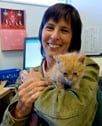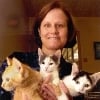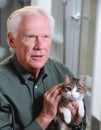
July 2013 by Kate Hurley, DVM, MPVM; Julie Levy, DVM, PhD, DACVIM; Richard Avanzino; Jon Cicirelli; Holly Sizemore
Audience: Executive Leadership, Foster Caregivers, Public, Shelter/Rescue Staff & Volunteers, Veterinary Team
Video Length: 101 minutes
In the first webcast of this two-part series, Dr. Kate Hurley, Director of the UC Davis Koret Shelter Medicine Program, asked attendees to examine the assumptions on which most policies about cat sheltering are based. The evidence, she said, suggests it's time for shelters to consider radical solutions to the suffering, stress, illness and death that are the fate of so many cats in our nation's animal shelters, including an array of positive alternative approaches such as TNR or not taking them in at all if we can't offer a lifesaving outcome.
That's a solution that shocks or dismays some animal advocates, but it's one with the potential to save millions of cats' lives, improve the quality of life for both cats and humans in our communities and make shelters more effective as agencies of care for cats.
In Part Two of Making the Case for a Paradigm Shift in Community Cat Management, Maddie's Fund® will present some of the nation's leading experts on animal sheltering and community cats in a comprehensive Q&A panel discussion on the information in Dr. Hurley's webcast.
The panelists are:
- Kate Hurley, DVM, MPVM, Director of the UC Davis Koret Shelter Medicine Program.
- Julie Levy, DVM, PhD, DACVIM, Director of Maddie's® Shelter Medicine Program at the University of Florida.
- Rich Avanzino, President of Maddie's Fund® and former Director of the San Francisco SPCA.
- Jon Cicirelli, Deputy Director of San Jose Animal Care & Services and Board Member of the California Animal Control Directors Association.
- Holly Sizemore, Director, National Programs, Community Programs and Services at Best Friends Animal Society.
Making the Case for a Paradigm Shift in Community Cat Management, Part Two is part of an ongoing series of educational programs from Maddie's Institute, the academic division of Maddie's Fund, providing the most innovative animal welfare information to shelter staff, veterinarians, rescue groups and community members to increase the lifesaving of homeless dogs and cats community-wide.
This program has not been approved for AAVSB RACE CE credit.
This course has been pre-approved for Certified Animal Welfare Administrator continuing education credits.

Kate Hurley, DVM, MPVM
Dr. Hurley has been working in shelters since 1989. Since completing the shelter medicine residency and undertaking the direction of the Koret Shelter Medicine Program, Dr. Hurley has become a recognized leader in the field of shelter medicine. She has worked extensively with shelters of every size and management type, and has consulted with shelters from all regions of the United States on subjects ranging from control of a specific outbreak to shelter health care programs and facility design. She regularly speaks nationally and internationally on topics related to shelter animal health.

Julie Levy, DVM, PhD, DACVIM
Dr. Julie Levy is director of Maddie's® Shelter Medicine Program at the University of Florida. The program provides comprehensive training for veterinary students and shelter medicine specialists, shelter consultations, disease outbreak investigations, continuing education, and research to solve the problems confronting animal shelters. Dr. Levy's research and clinical interests center on feline infectious diseases, neonatal kitten health, humane alternatives for cat population control, and immunocontraceptive vaccines for cats. Dr. Levy's accomplishments include publication of more than 100 journal articles and textbook chapters.

Richard Avanzino
Widely viewed as the father of the no-kill movement, Rich Avanzino has had a major influence on companion animal welfare over his 37 years in the industry. As President of Maddie's Fund, he directs the $300 million family foundation's effort to achieve and sustain a no-kill nation by providing solutions to the most challenging issues facing the animal welfare community through the combined efforts of Maddie's Institute (research and education), Maddie's CenterSM (hands-on animal care), and Maddie's® Grant Giving. Maddie's Fund has awarded more than $120 million in grants since 1999. Prior to joining Maddie's Fund, Rich was President of the San Francisco SPCA (1976 - 1999). He led San Francisco to become the first City and County in the nation to offer an adoption guarantee for every healthy shelter dog and cat and saved most of the treatable pets as well. Under his leadership, the city's euthanasia rates dropped to the lowest of any urban center in the nation. He also created adoption, animal behavior, feral cat and spay/neuter programs that have become models for the nation.

Jon Cicirelli
Since 2003, Jon Cicirelli has been the Director of Animal Care & Services in San Jose, CA. Jon has also been on the Board of the California Animal Control Directors Association for more than six years and the State Legislative Coordinator for four years. Jon began working with animals in a pet store. His interest in animals caused him to volunteer as a wildlife rehabilitation transporter and then as a volunteer assistant at the National Zoo in Washington, DC. His first job in animal welfare came as an Animal Control Officer in Arlington, VA in 1994. That position led to Chief of Field Operations four years later. His first experience as a Director of an agency was in the City of San Bernardino, CA. Jon has built community partnerships and implemented programs that have reduced the number of cats and kittens entering the San Jose shelter system by 25% in the last three years. Jon holds a Bachelor's degree in Biology from George Mason University and a Masters of Public istration from California State University, and in 2011 he was recognized by resolution of the California State Assembly for achievements and meritorious service to the community.

Holly Sizemore
Holly has volunteered and worked in many different animal welfare arenas, ranging from very small grassroots groups to large-scale public/private partnership efforts. She entered the animal welfare world in 1991 when she discovered a colony of community cats eating from a restaurant dumpster. The experience inspired her to help found the first TNR organization in Utah. In 2000, Holly joined No More Homeless Pets in Utah and served the organization in a variety of roles, ending with Executive Director from 2007 to 2010. During her time at No More Homeless Pets in Utah, the state saw a nearly 40% per-capita decrease in shelter euthanasia. In August 2010, Holly moved to Kanab to join the Community Programs and Services division. She spearheads the Best Friends Community Cats Programs focusing on shelter TNR throughout the country. She and her husband proudly share their home with ten cats, all former community cats.